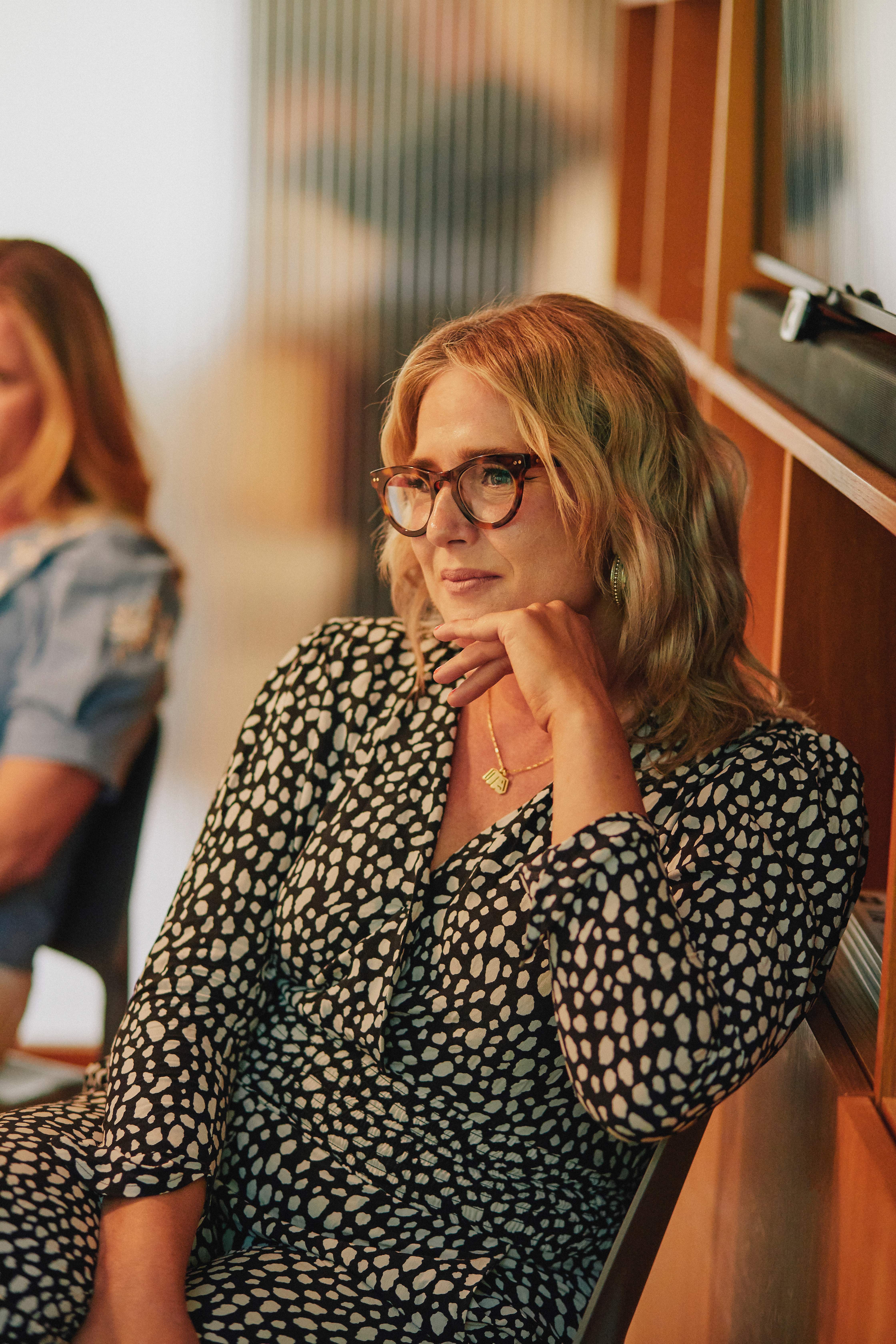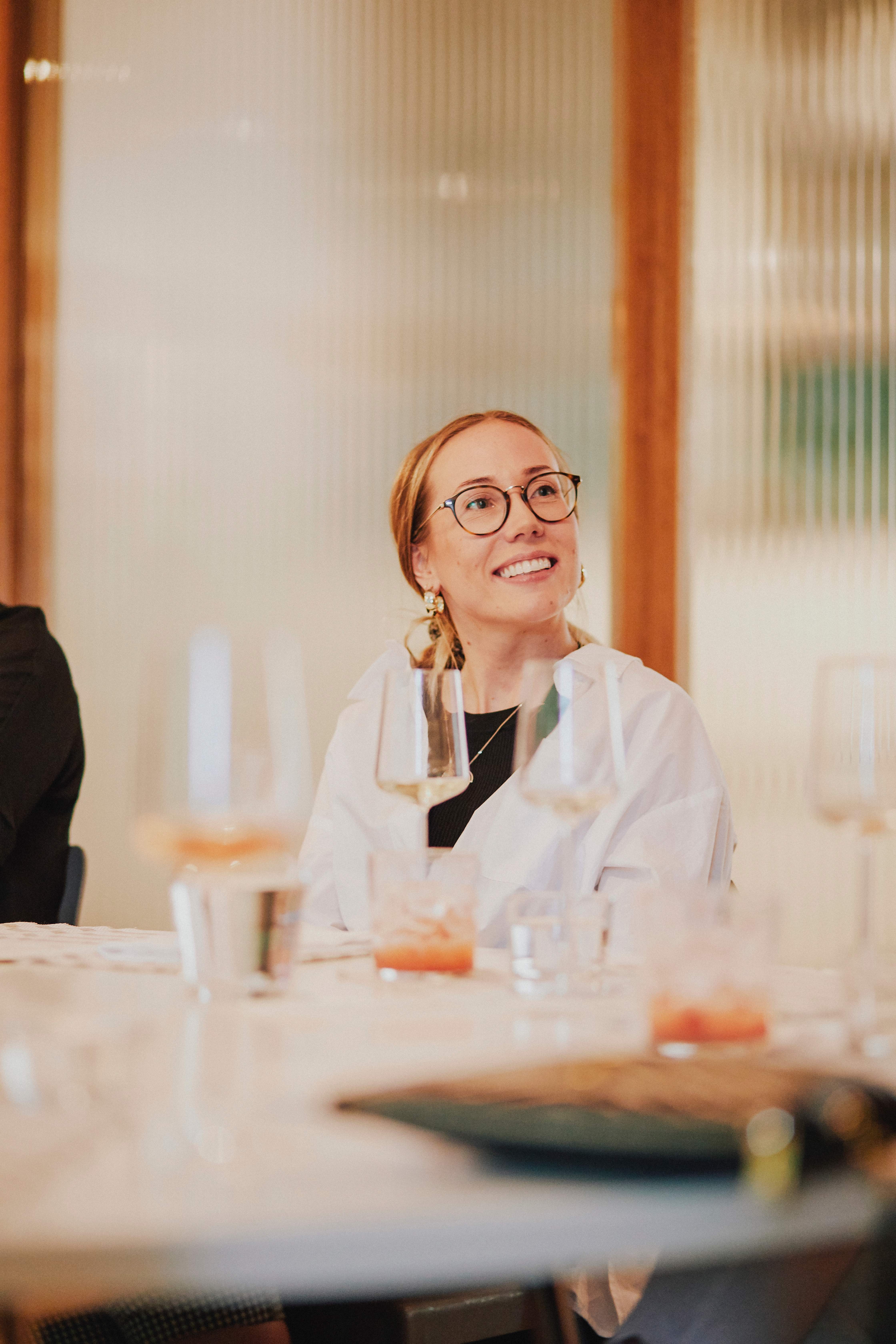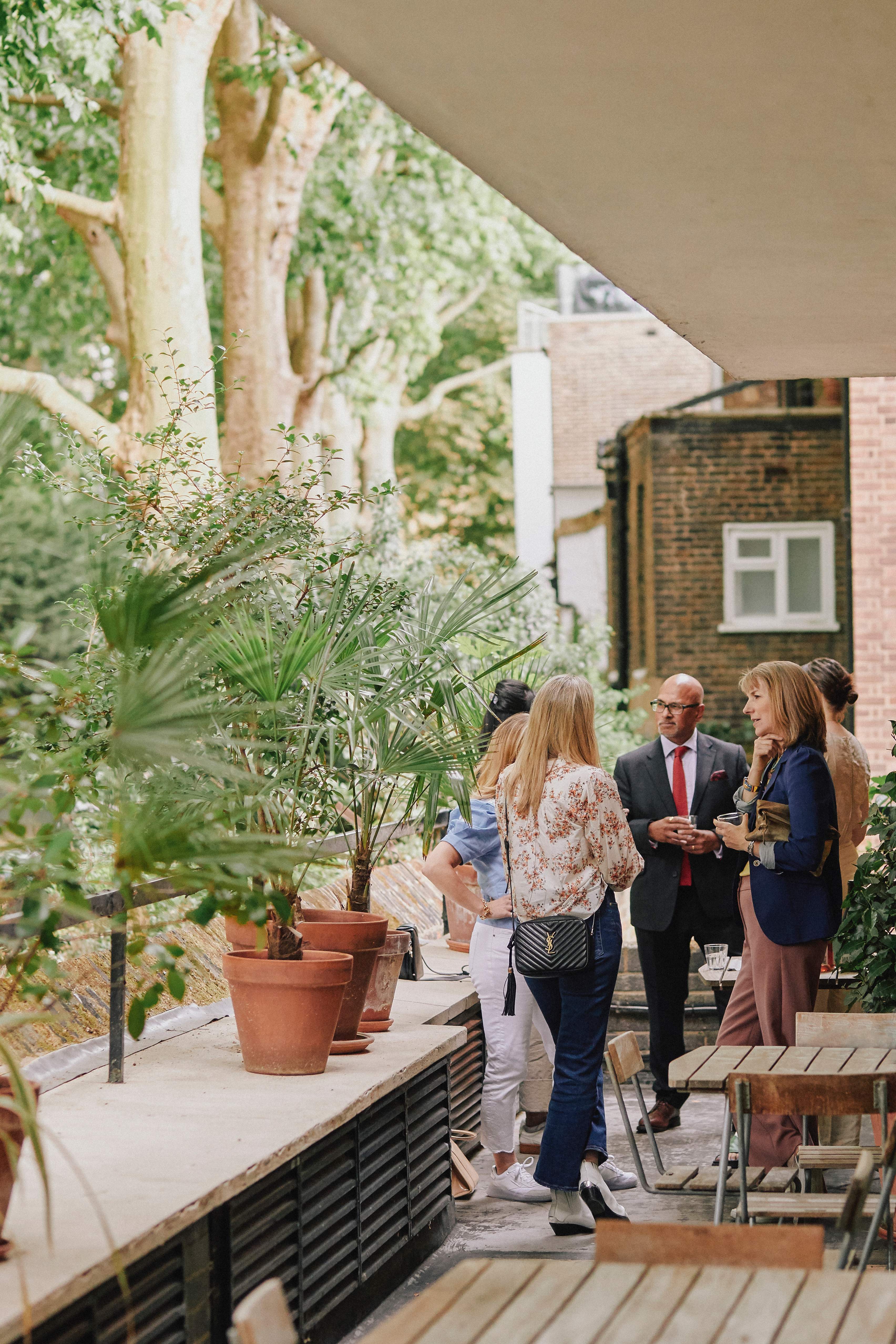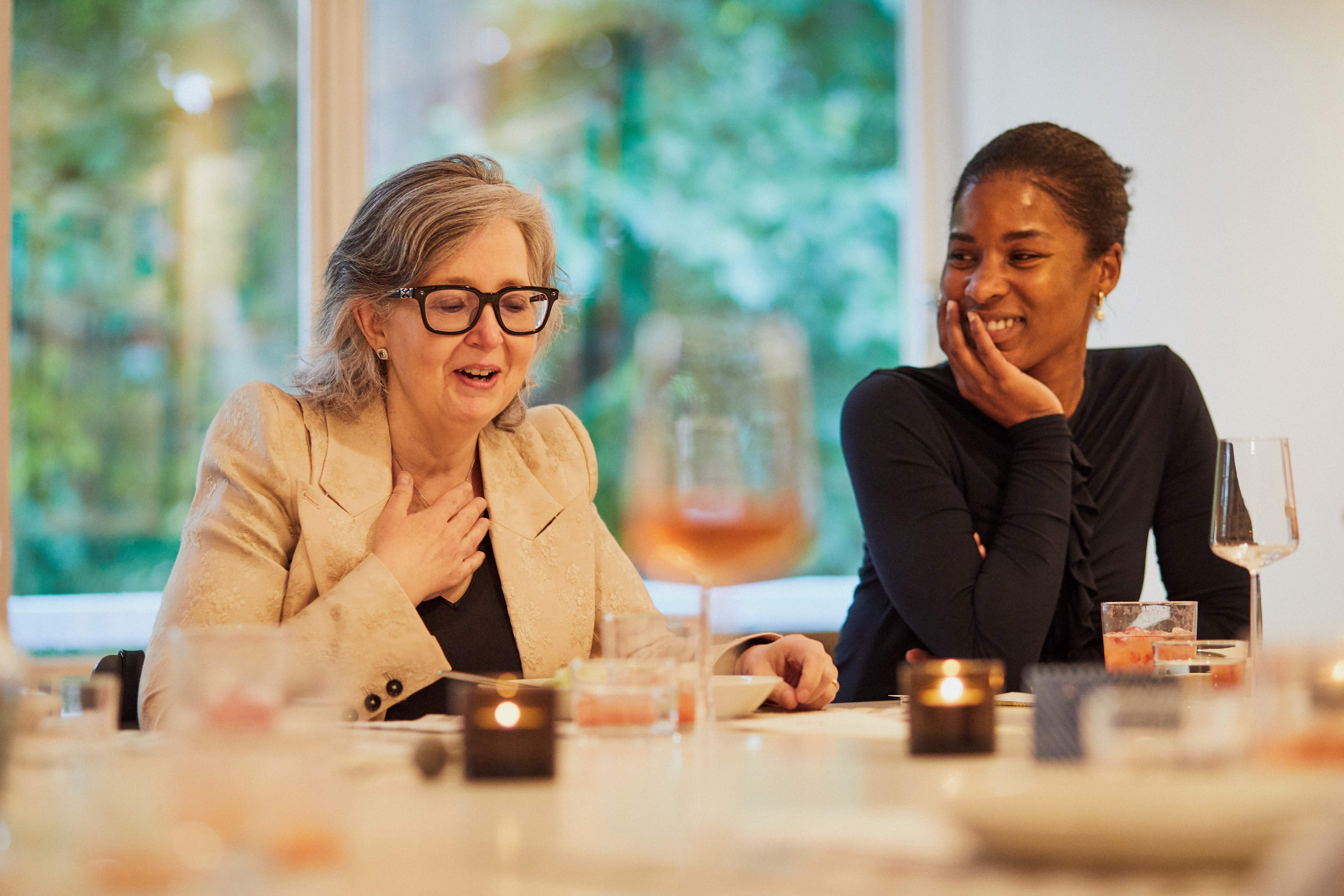Part three of five / London
Build
How can we help women re-enter the workforce after a career break? That was the topic of a dinner conversation held in London by The Adecco Group’s Innovation Foundation with Konfekt and Monocle.

THE CATERER
Continuing to showcase female chefs, for this dinner we chose Safiya Robinson of London-based social enterprise Sisterwoman Vegan, which holds supper clubs and promotes food education. Robinson’s dishes bring together Caribbean, African American and British flavours, reflecting her Jamaican background.
sisterwomanvegan.com
The Menu
Starter
Sticky roasted butternut squash with almond ricotta and smoked greens.
Main
Rice and pea arancini with brown stew mushroom, cashew cream and pickled cho cho.
Dessert
Lemon and blueberry cake by Luminary Bakery.
Drinks
Sisterwoman sorrel.
(From Blackbook Winery)
Painter of Light chardonnay 2020.
Nightjar pinot noir 2020. I’d Rather Be a Rebel rosé 2020.
THE SPEAKERS
Shareena Hatta (host)
Head of social innovation projects at The Innovation Foundation
Shareena oversees the foundation’s portfolio of project work.
innovationfoundation.net
Anna Whitehouse
Journalist and broadcaster
Anna campaigns for increased workplace flexibility with her Flex Appeal initiative.
Carly Fordham
Chief revenue officer of Arctic Shores
Carly’s company provides behaviour-based tests that assess job candidates’ potential and cognitive abilities.
Rachel Schofield
Journalist and former news presenter
Alongside her career as a journalist, Rachel is also a life coach specialising in helping women to rework their careers.
Camilla Rigby
Co-founder, The Women’s Work Lab
Camilla’s enterprise helps unemployed mothers who are seeking to get back into work after career breaks.
Sharla-Jaye Duncan
CEO of The Intrapreneurs Club
Sharla-Jaye’s platform connects young people from diverse backgrounds with the knowledge, resources and support that they need to pursue careers in technology.
Suneal Ram Kissun
Senior account manager at the London Progression Collaboration
Suneal works for a social-enterprise initiative that supports small businesses and helps low-paid Londoners to secure higher-quality sustainable work.
Tassanie Johnston
Founder of Xoandquin
Tassanie’s London-based business creates eco-friendly cards and packing supplies with a team comprising of working mothers.
Alice Williams
Founder, Luminary Bakery
At its two London locations, Alice’s social enterprise Luminary Bakery trains and employs disadvantaged women.
Jennifer Rademaker
Executive vice-president of global customer delivery for Mastercard
Jennifer leads a team responsible for the technical implementation of the multinational corporation’s products and is executive sponsor of initiatives to improve the inclusion of women in the workforce.


Return journeys
For our third conversation in a series of five, an array of dinner guests gathered at Midori House, Monocle’s London headquarters, to consider the various challenges facing women who seek to return to work after an absence and the roles of government, business and civil society in creating a supportive environment for them. The Innovation Foundation’s Shareena Hatta, the host of the evening, kicked things off...
Shareena: Thank you for being here with us. As you know, we have been exploring the idea of women re-entering work, particularly those who left in the wake of the pandemic. Camilla, you work with those who are reinventing themselves as they return to work. What are some of the recurring themes that you’ve seen?
Camilla: The people we work with tend to be lower in experience and skills, and have generally had negative experiences. At The Women’s Work Lab, we spend a lot of time talking to mothers returning to work, convincing them to value themselves and helping them to realise that they don’t have to compromise on what’s important to them. We want them to know that there are employers that will treat them well – they’re not unicorns.
Rachel: The women I work with are mostly between the ages of 40 and 50 and have had a professional career. They’ve stepped out of it by choice, usually to raise a family, and have felt privileged to have been able to do so. But they’re emerging a decade later, thinking, “I used to be somebody but I don’t have leverage any more.” They don’t know how to repackage their experience and make it credible to the outside world, despite being very smart women.
Shareena: In terms of building confidence, does it help to create a community around similar experiences? Is that something you’ve seen at the Luminary Bakery, Alice?
Alice: It’s amazing seeing women forming close communities. They might not know what everyone else has been through but they’re aware that they’ve all had some hard times. They’re so motivated to build a career, put the past behind them and move forward. There’s a real feeling of being in it together.
Adapting to change
Shareena: Workplaces have changed significantly over the past two years. Flexibility is growing but it doesn’t always deliver what individuals want and need. What are we learning?
Jennifer: At Mastercard what we realised over that period is that many of us can work remotely. But we’ve also noticed that, for creativity to flourish, we need to be face to face. We’re concerned about younger women who joined at the height of the pandemic, as it has become apparent that they don’t have the same networks as those who have had plenty of water-cooler moments at the office. We want them to feel as though they’re able to progress up the career ladder but worry that this has become harder. On the flipside, we have tried to be forward-thinking about flexibility. Employees can now spend four weeks a year working from anywhere in the world. It’s great for those who have parents living far away, for example, or those with caring responsibilities.
Anna: Deloitte has managed to do something quite clever: on its website are case studies of different ways of working flexibly for the company. So you might read about someone who does charity work for two days a week and works at Deloitte on the other three. That employee’s email address is available so you can reach out to them before a job interview and ask questions about how it works for them. All of those issues usually get left to the last minute when applying for a job. That kind of corporate transparency is important and it hardly costs a company anything.
Shareena: Improving hiring processes is important. That’s something you’re well versed in through your work at Arctic Shores, Carly.
Carly: Yes. What we’re aiming to do with our assessments is to help remove the bias in recruiting.
Anna: How do you go about that?
Carly: By looking at someone’s behaviour. Our assessments are like a game in the way that people interact with them and they help us to understand their personality. We want to observe their traits because in an interview people will tell you what they think you want to hear. We’re trying to see not only whether someone is able to do the job but also whether they will enjoy it and do it well.
Shareena: While technology is a useful enabler, how does having in-person time drive equity in the workplace?
Suneal: I had my first big, face-to-face meeting yesterday after nearly a year. I had to dust off my old suit. We spent two or three hours talking and I got so much out of it. It would have been very different on a Zoom call because you usually only have about 30 minutes and I wouldn’t have captured those extra nuggets that I got from seeing a person and socialising. I particularly feel this while doing business in the Gulf region. People want to see you and build a lasting relationship based on mutual trust and transparency.
Sharla-Jaye: At The Intrapreneurs Club I’ve been meeting a lot of potential investors. One thing that we keep hearing is that they want to meet in person to better understand the venture. Online slide decks are all well and good but they can only take investors so far. They want to get a feel for who you are and you can only achieve that face to face.



New beginnings
Shareena: We’ve spoken about what employers can do to support women but what can be done at a policy level? Suneal, at the London Progression Collaboration, you’re working with employers and government. What are the real impediments?
Suneal: Over the past two years we’ve created 1,000 new apprenticeships. About 56 per cent of the apprentices are female and 60 per cent are from underserved or under-represented communities. We’re enabling gender equality and inclusion in certain sectors, such as digital technology and construction, but we also want to support sectors like adult social care or early-years care, which are vital to London’s economy. That’s fundamental both for business and for anyone coming back into work. You need effective childcare or social-care provision that isn’t prohibitively expensive and doesn’t impede individuals from taking a new job. We encourage the London Living Wage at £11.05 an hour and support small employers with putting unspent levy funds towards training.
Shareena: Again, the big societal building blocks are very important.Support at a government level in early years can pay off when it comes to the long-term economic prospects of women with caring commitments.
Anna: I had a baby in Amsterdam and another in England. In the Netherlands, you get 10 days with a kraamzorg, a maternity nurse who lives with you, helps you breastfeed and helps to feed you. The Dutch government has realised that if it invests in maternal mental health in the first 10 days after the birth of a child, the cost to the healthcare system is lower further down the line. When you return to work, you have a mamadag and papadag: parents can take one day off a week for childcare until the child is eight.
Shareena: Is it a bad sign that employers are finding it hard to retain women? And how can setting up your own business allow you to be the kind of employer that you would want?
Tassanie: I started my greeting-card business when I was pregnant with my third child. I specifically recruit parents so I try to create the kinds of jobs that I would want myself as a working mother. We only work during school hours and we close over the holidays. I have six employees now; the first started a year ago. She’s a single mum.
Anna: If I’m being honest, I would still like to be working for a company. I liked the structure and security. I know other women like me who set up their own venture not as a choice but as a last-chance option.
Rachel: There’s a terrible irony when it comes to women who decide to set up their own businesses. Of course, it’s incredibly empowering but many become founders because they can’t find a job with hours that work for them or they can’t get people to take them seriously after a career break. The obvious path seems to be to launch their own thing.
Shareena: So we have heard about the challenges of confidence and the ability to pivot, as well as the role of employers and policy in providing support and an enabling environment. Clearly this isn’t a problem that a single actor can solve. We look forward to continuing this conversation in the forthcoming instalments of the series.




